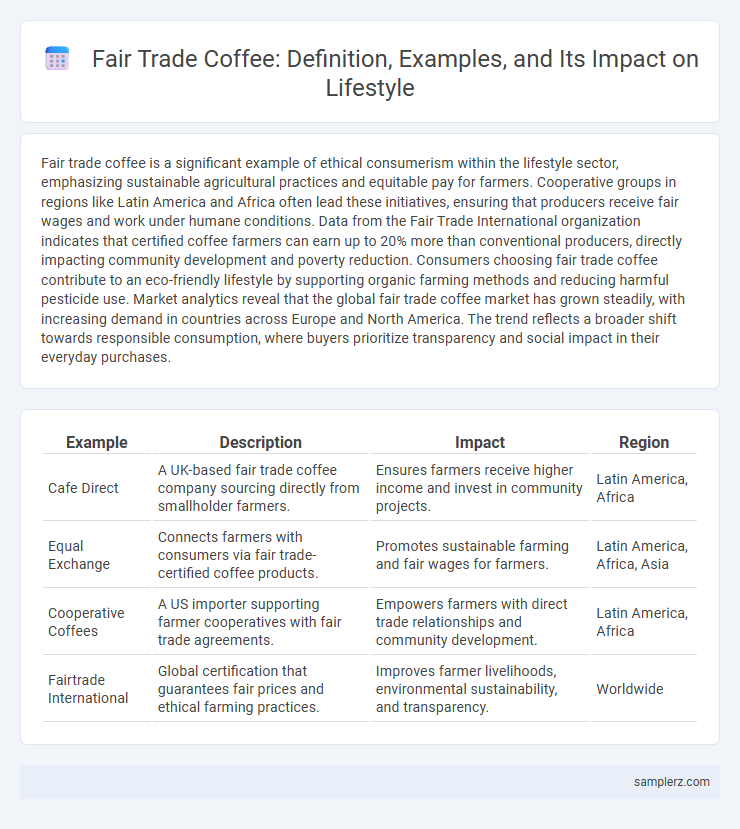Fair trade coffee is a significant example of ethical consumerism within the lifestyle sector, emphasizing sustainable agricultural practices and equitable pay for farmers. Cooperative groups in regions like Latin America and Africa often lead these initiatives, ensuring that producers receive fair wages and work under humane conditions. Data from the Fair Trade International organization indicates that certified coffee farmers can earn up to 20% more than conventional producers, directly impacting community development and poverty reduction. Consumers choosing fair trade coffee contribute to an eco-friendly lifestyle by supporting organic farming methods and reducing harmful pesticide use. Market analytics reveal that the global fair trade coffee market has grown steadily, with increasing demand in countries across Europe and North America. The trend reflects a broader shift towards responsible consumption, where buyers prioritize transparency and social impact in their everyday purchases.
Table of Comparison
| Example | Description | Impact | Region |
|---|---|---|---|
| Cafe Direct | A UK-based fair trade coffee company sourcing directly from smallholder farmers. | Ensures farmers receive higher income and invest in community projects. | Latin America, Africa |
| Equal Exchange | Connects farmers with consumers via fair trade-certified coffee products. | Promotes sustainable farming and fair wages for farmers. | Latin America, Africa, Asia |
| Cooperative Coffees | A US importer supporting farmer cooperatives with fair trade agreements. | Empowers farmers with direct trade relationships and community development. | Latin America, Africa |
| Fairtrade International | Global certification that guarantees fair prices and ethical farming practices. | Improves farmer livelihoods, environmental sustainability, and transparency. | Worldwide |
Understanding Fair Trade Coffee: Key Principles
Fair trade coffee ensures ethical sourcing by promoting equitable wages and safe working conditions for farmers, fostering sustainable agricultural practices that protect the environment. This certification requires transparency throughout the supply chain, empowering producers with fair prices and long-term trading relationships. Emphasizing community development and social justice, fair trade coffee supports initiatives that improve farmers' livelihoods and promote economic resilience.
How Fair Trade Certification Works in the Coffee Industry
Fair Trade certification in the coffee industry ensures that coffee farmers receive fair prices and work under safe conditions by meeting specific social, economic, and environmental standards verified through regular audits. Certified cooperatives must demonstrate sustainable farming practices, fair labor rights, and transparent financial management to maintain their status. This system promotes equitable trade relationships, empowering farmers in developing countries while providing consumers with ethically sourced coffee products.
Ethical Coffee Brands Supporting Fair Trade
Ethical coffee brands such as Equal Exchange, Divine Chocolate, and Alter Eco prioritize fair trade practices by ensuring farmers receive equitable wages and fostering sustainable agriculture. These companies invest in transparent supply chains and community development, promoting environmental stewardship and economic empowerment. Supporting fair trade coffee not only improves livelihoods but also encourages responsible consumption and global social justice.
Impact of Fair Trade on Coffee Farmers’ Livelihoods
Fair Trade certification improves coffee farmers' livelihoods by guaranteeing minimum prices that protect them from market volatility and provide stable incomes. Enhanced access to international markets and fair wages enables investment in better farming techniques, education, and healthcare. Studies show Fair Trade farmers experience improved community development and reduced poverty compared to conventional coffee producers.
Popular Fair Trade Coffee Products You Can Buy
Popular fair trade coffee products include brands like Equal Exchange, Kicking Horse Coffee, and Cafe Direct, each committed to ethical sourcing and sustainable farming practices. These products ensure farmers receive fair wages and promote environmental stewardship, improving the livelihoods of coffee-growing communities. Choosing fair trade coffee supports transparency and social responsibility within the global coffee market.
Coffee Cooperatives and Fair Trade Practices
Coffee cooperatives play a vital role in promoting fair trade practices by ensuring that small-scale farmers receive equitable prices for their beans, supporting sustainable agriculture and community development. These cooperatives engage in direct trade relationships that eliminate intermediaries, enabling farmers to invest in better farming techniques and improve their livelihoods. Fair trade certification within these cooperatives guarantees ethical sourcing, environmental protection, and social equity across the coffee supply chain.
Fair Trade Coffee vs. Conventional Coffee: What’s the Difference?
Fair Trade coffee ensures farmers receive fair wages and work under ethical conditions, improving their livelihoods compared to conventional coffee farming, which often exploits labor and harms the environment. Certified Fair Trade coffee supports sustainable agricultural practices that protect soil health and biodiversity, while conventional coffee farming may involve harmful pesticides and deforestation. Choosing Fair Trade coffee promotes social equity, environmental sustainability, and higher quality products, making it a responsible lifestyle choice.
Sustainable Farming Techniques in Fair Trade Coffee
Fair trade coffee employs sustainable farming techniques such as agroforestry, organic cultivation, and water conservation to enhance environmental health and biodiversity. These practices reduce chemical use and promote soil fertility, ensuring long-term viability for small-scale farmers. By supporting fair trade coffee, consumers contribute to ethical production methods that prioritize ecological balance and community well-being.
The Role of Consumers in Promoting Fair Trade Coffee
Consumers drive fair trade coffee markets by choosing ethically sourced brands that ensure farmers receive equitable wages and sustainable working conditions. Supporting certifications like Fair Trade International or Rainforest Alliance empowers small-scale producers, enhancing their livelihoods and promoting environmental stewardship. Conscious purchasing decisions contribute to a global movement towards social justice and economic fairness in the coffee industry.
Challenges and Opportunities in Fair Trade Coffee Markets
Fair trade coffee markets face challenges such as fluctuating global prices, limited access to premium consumer markets, and the complexity of maintaining certification standards. Opportunities arise from growing consumer awareness and demand for ethically sourced products, enabling producers to achieve better income stability and community development. Enhanced transparency and direct trade relationships further support fair trade initiatives by fostering trust and improving market access for small-scale farmers.

example of fair trade in coffee Infographic
 samplerz.com
samplerz.com